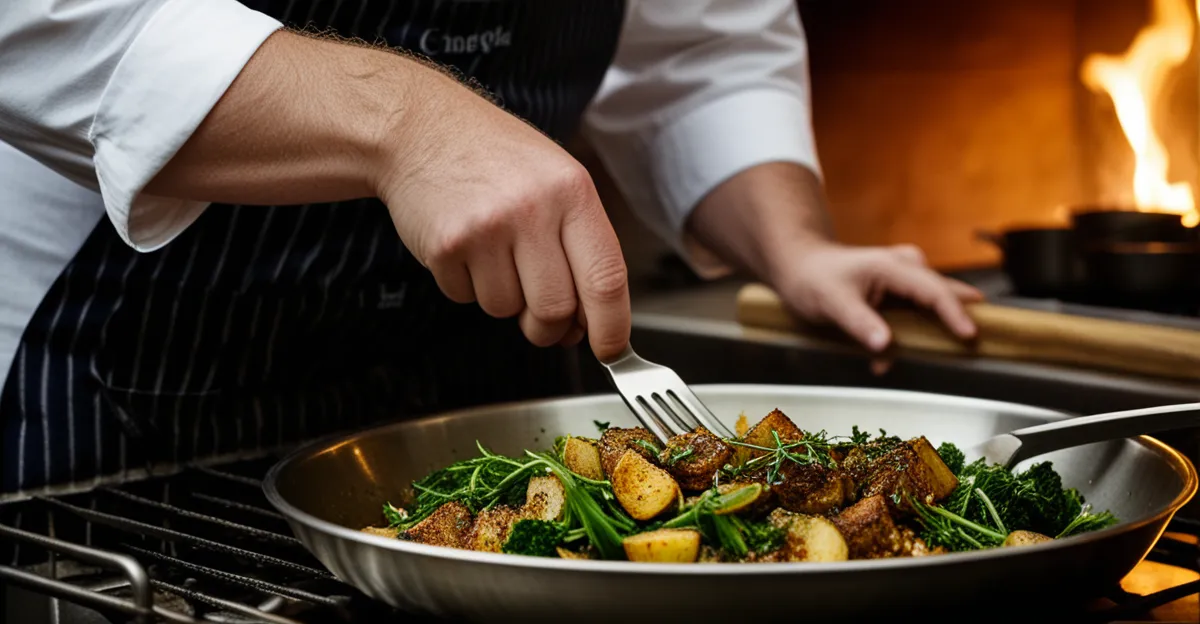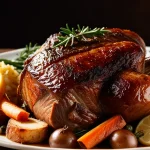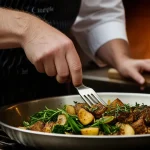Integrating Sustainability into Traditional UK Cooking
Sustainability practices are increasingly essential in traditional UK cooking as environmental concerns grow. Eco-friendly cooking embraces methods that reduce waste, lower carbon footprints, and use resources responsibly, all while preserving the rich heritage of British cuisine.
Classic British dishes can be adapted to incorporate sustainability principles by focusing on local ingredients and minimizing energy consumption during cooking. For example, slow-cooked stews traditionally rely on lengthy simmering times, which can be improved by using energy-efficient appliances without compromising flavor.
Also read : What are some authentic recipes for a traditional Sunday roast?
Sustainability practices also highlight the value of seasonality and minimizing food waste. Classic recipes like shepherd’s pie or fish and chips can be reimagined by substituting ingredients with local, seasonal produce or by introducing plant-based components to reduce reliance on resource-intensive items. This approach not only honors traditional UK cooking but also supports the environment and local economies.
By integrating these practices, cooks can maintain the cultural significance of British dishes while advancing eco-friendly cooking and sustainability principles in everyday kitchen routines. This fusion of tradition and sustainability ensures that British culinary heritage can thrive in a modern, environmentally conscious world.
Additional reading : How can you incorporate seasonal fruits into British desserts?
Using Local and Seasonal Ingredients in British Recipes
Incorporating local ingredients and seasonal British produce is a cornerstone of sustainable British cooking. Utilizing foods harvested close to home reduces food miles, directly lowering the carbon footprint associated with transportation. This practice supports sustainability practices by encouraging consumers to choose fresh, locally grown items rather than imported alternatives that require extensive shipping.
Seasonality plays a crucial role in reinterpreting traditional UK cooking. For example, classic stews can be made with root vegetables like carrots and parsnips in winter, which are readily available and sustainable during colder months. In summer, incorporating fresh peas or new potatoes adds a vibrant, seasonal twist to familiar dishes like pies or roasts. These ingredient swaps not only enhance flavor seasonally but also reduce reliance on out-of-season produce that demands intensive cultivation or storage methods.
Supporting local farms and markets strengthens community ties and boosts the local economy while promoting sustainability practices. By purchasing from local growers, consumers help sustain agricultural diversity and preserve traditional farming methods tied to British culinary heritage. This direct connection ensures that classic dishes maintain authenticity while embracing eco-friendly cooking principles, making every meal a step toward a greener future.
Reducing Food Waste with Classic British Dishes
Minimizing food waste is a pivotal aspect of sustainable British recipes. Traditional UK cooking offers numerous opportunities for reducing food waste through creative reuse and careful portion management. For example, dishes like bubble and squeak make excellent use of leftover vegetables and potatoes, transforming them into a tasty meal rather than discarding unused ingredients. Similarly, bread pudding repurposes stale bread efficiently, preventing unnecessary waste.
Effective portion management is crucial in British kitchens to avoid over-preparation. Preparing the right quantities and storing leftovers properly extends food usability and prevents spoilage. Utilizing airtight containers and cooling foods quickly are practical tips that reduce waste significantly.
Beyond leftovers, sustainable British recipes encourage using parts of ingredients often discarded, such as vegetable trimmings or meat bones, by incorporating them into stocks or soups. This holistic use exemplifies sustainability practices within traditional UK cooking, ensuring that every component contributes to a nourishing meal while minimizing environmental impact.
Sustainable Sourcing for Meat and Seafood
Sustainability practices within traditional UK cooking increasingly emphasize the importance of sourcing meat and seafood responsibly. Choosing sustainable meat means selecting products from animals raised with care for welfare and environmental impact, often certified by trusted labels that verify ethical rearing methods. This ensures that British meat dishes maintain their authentic flavors while aligning with eco-friendly cooking principles.
Ethical fishing is vital when incorporating seafood into British recipes. Opting for fish varieties caught through sustainable methods helps preserve marine ecosystems and support biodiversity. For instance, dishes like fish and chips can be updated by selecting sustainably caught cod or haddock, reducing the pressure on overfished stocks.
Another key sustainability practice involves introducing plant-based twists to classic meat-rich recipes. Incorporating legumes or mushrooms, for example, can reduce reliance on resource-heavy animal products without sacrificing the hearty character traditional UK cooking is known for. This approach supports both environmental goals and evolving dietary preferences.
Overall, sustainable sourcing for meat and seafood is essential for bridging the gap between heritage and modern sustainability practices, encouraging conscious choices that protect natural resources while honoring cherished British culinary traditions.
Adapting Traditional Baking for Sustainability
Sustainable baking in traditional UK cooking involves rethinking classic British cakes and breads through the lens of eco-friendly ingredients and energy conservation. Replacing conventional components like refined flour, dairy, and eggs with organic, locally sourced alternatives reduces environmental impact significantly. Using organic wholemeal flour or milled grains from nearby mills supports local agriculture and cuts down on carbon emissions tied to transportation.
One key sustainability practice is reducing reliance on dairy and eggs, which have higher ecological footprints. Substitutions such as plant-based milks, apple sauce, or flaxseed can maintain texture and moisture in baked goods while lowering resource demands. This approach aligns with the evolving preferences of many seeking healthier, more ethical options without sacrificing the familiarity of beloved British baking traditions.
Energy efficiency is another pillar of eco-friendly cooking in traditional baking. Employing modern ovens with better insulation or baking multiple items simultaneously helps minimize electricity or gas use. Additionally, adapting baking times and temperatures to suit smaller batch sizes can prevent unnecessary energy consumption.
In sum, adapting traditional baking incorporates sustainability practices by focusing on ingredient choices and smarter energy use, ensuring that British cakes and breads continue to delight while fostering environmental responsibility. This blend of heritage and innovation exemplifies how classic recipes can evolve to meet contemporary ecological challenges.





